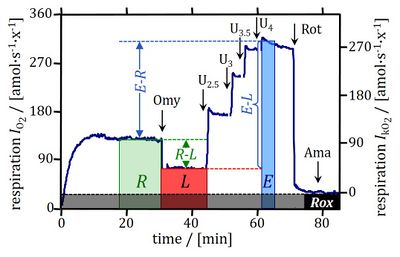Units in figures and tables: Difference between revisions
(Created page with "{{MitoPedia |abbr= |description='''Units in figures and tables''' are specified together with the numerical values. The ''value'' of a quantity ''Q'' is the product of a num...") |
No edit summary |
||
| (3 intermediate revisions by 2 users not shown) | |||
| Line 1: | Line 1: | ||
{{MitoPedia | {{MitoPedia | ||
|description='''Units in figures and tables''' are specified together with the numerical values. The ''value'' of a quantity ''Q'' is the product of a [[number]] ''N'' and a [[unit]] ''u''<sub>''Q''</sub>. Abstract units ''u''<sub>''Q''</sub> (such as dm<sup>3</sup>=L, kg, J) are linked to measured quantities (such as volume, mass, energy): | |||
|description='''Units in figures and tables''' are specified together with the numerical values. The ''value'' of a quantity ''Q'' is the product of a [[number]] ''N'' and a [[unit]] ''u''<sub>''Q''</sub>. Abstract units ''u''<sub>''Q''</sub> (such as L, kg, J) are linked to measured quantities (such as volume, mass, energy): | |||
Eq.(1) ''Q''<sub>''u''</sub> = ''N''·''u''<sub>''Q''</sub> | Eq.(1) ''Q''<sub>''u''</sub> = ''N''·''u''<sub>''Q''</sub> | ||
The multiplication in Eq.(1) can be handled like any mathematical equation and re-arranged to the form which indicates the meaning (left) of a number (right): | The multiplication in Eq.(1) can be handled like any mathematical equation and re-arranged to the form which indicates the meaning (left) of a number (right): | ||
Eq.( | Eq.(2a) ''Q''<sub>''u''</sub>/''u''<sub>''Q''</sub> = ''N'' | ||
Eq.(2b) ''N''<sub>''X''</sub>/x = ''N'' | |||
When numbers are given on the axes of figures and in tables, the corresponding labels should be indicated according to Eq.(2). | When numbers are given on the axes of figures and in tables, the corresponding labels should be indicated according to Eq.(2), where Eq.(2a) applies to measured quantities, whereas Eq.(2b) relates to the countable quantity, i.e. [[count]] with unit [x]. For example, the axis label for volume-specific oxygen flux may be written as ''J''<sub>''V'',O<sub>2</sub></sub> / [pmol/(s·mL)] and cell-count specific oxygen flow as ''I''<sub>O<sub>2</sub></sub> / [amol/(s·x)]. | ||
|info= | |||
* [[Bureau International des Poids et Mesures 2019 The International System of Units (SI)| Bureau International des Poids et Mesures (2019) The International System of Units (SI). 9th edition:117-216. ISBN 978-92-822-2272-0]] | |||
* Gnaiger E (2021) The elementary unit — canonical reviewer's comments on: Bureau International des Poids et Mesures (2019) The International System of Units (SI) 9th ed. https://doi.org/10.26124/mitofit:200004.v2 | |||
}} | |||
__TOC__ | |||
Communicated by [[Gnaiger Erich]] (2022-11-06) | |||
== Lower case == | |||
:::: For the full name of units that received their names related to an individual scientist, the name of the unit is written in lower case, even if its abbreviation is written in upper case, e.g. the unit joule is abbreviated as J. | |||
:::: If labels of axes and tables are started with a word or term written with the initial in upper case, e.g. Time / [s] or Gibbs energy / [kJ], then the specific information is omitted that is otherwise provided by the distinction between upper and lower case. The latter convention is preferred, e.g. time / [s] and Gibbs energy / [kJ]. | |||
== Brackets [] == | |||
:::: There is no general convention for using parentheses or brackets to indicate units. In ''J''<sub>''V'',O<sub>2</sub></sub> / [pmol/(s·mL)], the brackets are required, whereas in ''J''<sub>''V'',O<sub>2</sub></sub> / [pmol·s<sup>-1</sup>·mL<sup>-1</sup>] the brackets might be replaced by parentheses, and in time ''t'' / [s] the brackets could be omitted. However, the general use of brackets to indicate units is a useful convention in labels of axes and tables and in the general text. | |||
== Examples == | |||
::::::: [[File:Table RT.png|200px]] | |||
:::: [[File:Huetter 2004 Biochem J.jpg|400px|ceCCP living cells (fibroblasts)|link=Huetter 2004 Biochem J]] | |||
{{MitoPedia | {{MitoPedia topics | ||
|mitopedia | |mitopedia topic=BEC | ||
}} | }} | ||
Latest revision as of 05:55, 15 November 2022
Description
Units in figures and tables are specified together with the numerical values. The value of a quantity Q is the product of a number N and a unit uQ. Abstract units uQ (such as dm3=L, kg, J) are linked to measured quantities (such as volume, mass, energy):
Eq.(1) Qu = N·uQ
The multiplication in Eq.(1) can be handled like any mathematical equation and re-arranged to the form which indicates the meaning (left) of a number (right):
Eq.(2a) Qu/uQ = N Eq.(2b) NX/x = N
When numbers are given on the axes of figures and in tables, the corresponding labels should be indicated according to Eq.(2), where Eq.(2a) applies to measured quantities, whereas Eq.(2b) relates to the countable quantity, i.e. count with unit [x]. For example, the axis label for volume-specific oxygen flux may be written as JV,O2 / [pmol/(s·mL)] and cell-count specific oxygen flow as IO2 / [amol/(s·x)].
Reference:
- Bureau International des Poids et Mesures (2019) The International System of Units (SI). 9th edition:117-216. ISBN 978-92-822-2272-0
- Gnaiger E (2021) The elementary unit — canonical reviewer's comments on: Bureau International des Poids et Mesures (2019) The International System of Units (SI) 9th ed. https://doi.org/10.26124/mitofit:200004.v2
Communicated by Gnaiger Erich (2022-11-06)
Lower case
- For the full name of units that received their names related to an individual scientist, the name of the unit is written in lower case, even if its abbreviation is written in upper case, e.g. the unit joule is abbreviated as J.
- If labels of axes and tables are started with a word or term written with the initial in upper case, e.g. Time / [s] or Gibbs energy / [kJ], then the specific information is omitted that is otherwise provided by the distinction between upper and lower case. The latter convention is preferred, e.g. time / [s] and Gibbs energy / [kJ].
Brackets []
- There is no general convention for using parentheses or brackets to indicate units. In JV,O2 / [pmol/(s·mL)], the brackets are required, whereas in JV,O2 / [pmol·s-1·mL-1] the brackets might be replaced by parentheses, and in time t / [s] the brackets could be omitted. However, the general use of brackets to indicate units is a useful convention in labels of axes and tables and in the general text.
Examples
MitoPedia topics:
BEC


